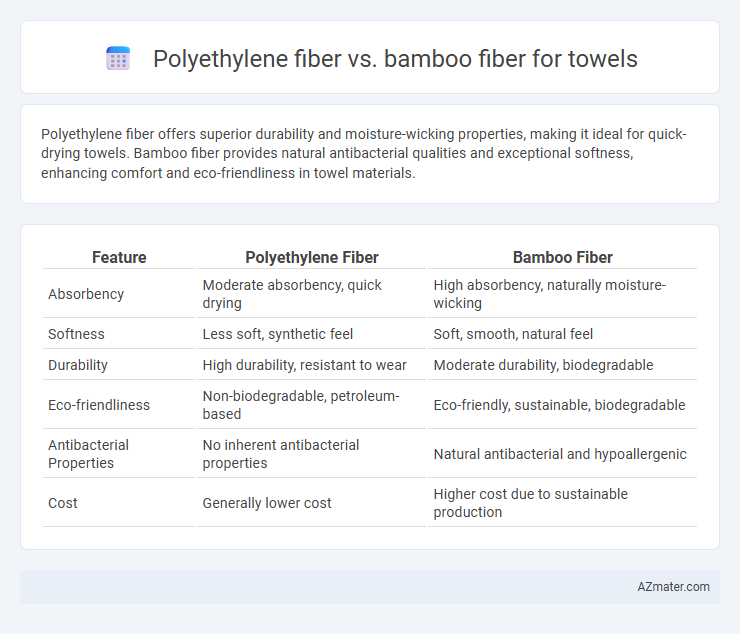Polyethylene fiber offers superior durability and moisture-wicking properties, making it ideal for quick-drying towels. Bamboo fiber provides natural antibacterial qualities and exceptional softness, enhancing comfort and eco-friendliness in towel materials.
Table of Comparison
| Feature | Polyethylene Fiber | Bamboo Fiber |
|---|---|---|
| Absorbency | Moderate absorbency, quick drying | High absorbency, naturally moisture-wicking |
| Softness | Less soft, synthetic feel | Soft, smooth, natural feel |
| Durability | High durability, resistant to wear | Moderate durability, biodegradable |
| Eco-friendliness | Non-biodegradable, petroleum-based | Eco-friendly, sustainable, biodegradable |
| Antibacterial Properties | No inherent antibacterial properties | Natural antibacterial and hypoallergenic |
| Cost | Generally lower cost | Higher cost due to sustainable production |
Introduction to Polyethylene and Bamboo Fibers
Polyethylene fiber, a synthetic polymer derived from ethylene, is renowned for its high strength, durability, and resistance to moisture, making it ideal for towel applications that require quick drying and long-lasting performance. Bamboo fiber, sourced from the pulp of bamboo grass, offers natural antibacterial properties, excellent absorbency, and biodegradability, appealing to eco-conscious consumers seeking sustainable towel options. Each fiber type provides unique benefits: polyethylene excels in resilience and water repellency, while bamboo delivers softness and environmental friendliness.
Key Properties of Polyethylene Fiber Towels
Polyethylene fiber towels are highly durable, water-resistant, and lightweight, making them excellent for quick-drying applications and outdoor use. Their hydrophobic nature prevents water absorption, which reduces drying time and inhibits bacterial growth, enhancing hygiene. In contrast to bamboo fiber towels that excel in softness and absorbency, polyethylene fiber emphasizes strength and moisture repellency, ideal for long-lasting performance.
Key Properties of Bamboo Fiber Towels
Bamboo fiber towels are highly absorbent, naturally antimicrobial, and eco-friendly, making them a superior choice compared to polyethylene fibers, which are synthetic and less breathable. Bamboo fibers offer softness comparable to cotton and are biodegradable, reducing environmental impact. Their moisture-wicking properties help towels dry quickly, promoting a refreshing and hygienic experience.
Absorbency Comparison: Polyethylene vs Bamboo
Bamboo fiber towels offer superior absorbency compared to polyethylene fiber due to their natural micro-gaps and hollow structure that trap moisture efficiently. Polyethylene fiber, being synthetic and non-porous, tends to repel water rather than absorb it, making it less effective for drying purposes. Bamboo fiber's high absorbency level around 3-4 times that of cotton provides a more reliable and comfortable drying experience.
Softness and Comfort: Which Fiber Wins?
Bamboo fiber towels are renowned for their exceptional softness and natural moisture-wicking properties, providing a luxurious feel and enhanced comfort against the skin. Polyethylene fiber towels, while durable and quick-drying, generally lack the plush texture and breathability that contribute to a cozy user experience. For superior softness and comfort, bamboo fiber towels consistently outperform polyethylene fiber options.
Durability and Longevity of Towels
Polyethylene fiber towels offer superior durability due to their strong synthetic structure, resisting wear and tear better than natural fibers. Bamboo fiber towels, while eco-friendly and naturally antimicrobial, tend to have a shorter lifespan due to fiber degradation over time and frequent washing. Choosing polyethylene fiber ensures longer-lasting towels that maintain their shape and functionality through extensive use.
Eco-Friendliness and Sustainability Analysis
Bamboo fiber towels are highly eco-friendly due to bamboo's rapid growth rate, minimal pesticide use, and natural biodegradability, making them a sustainable choice for environmentally conscious consumers. Polyethylene fiber towels, often derived from non-renewable petroleum resources, pose challenges in sustainability due to their energy-intensive production and longer decomposition time in landfills. Bamboo fiber outperforms polyethylene fiber in reducing carbon footprint and waste accumulation, aligning better with sustainable textile production goals.
Antibacterial and Hypoallergenic Features
Bamboo fiber towels offer superior antibacterial properties due to natural antimicrobial agents called bamboo kun, effectively inhibiting bacterial growth and odor. Polyethylene fiber towels, while durable and moisture-wicking, lack inherent antibacterial qualities and may require chemical treatments to achieve similar effects. Bamboo fiber is also highly hypoallergenic, making it ideal for sensitive skin, whereas polyethylene fibers may cause irritation in some individuals due to synthetic material composition.
Cost-Effectiveness: Polyethylene vs Bamboo Towels
Polyethylene fiber towels offer superior cost-effectiveness due to their lower production expenses and higher durability, resulting in longer product lifespan compared to bamboo fiber towels. Bamboo fiber towels, while more eco-friendly and naturally antimicrobial, tend to have higher manufacturing costs that increase retail prices. The balance between affordability and sustainability often leads consumers to choose polyethylene towels for budget-conscious purchases without sacrificing performance.
Conclusion: Choosing the Best Fiber for Towels
Polyethylene fiber offers high durability, water resistance, and quick-drying properties, making it ideal for towels used in sports or outdoor activities. Bamboo fiber excels in softness, natural antibacterial qualities, and eco-friendliness, suitable for those seeking breathable and hypoallergenic towels. The best fiber choice depends on whether durability or sustainability and comfort are prioritized for towel use.

Infographic: Polyethylene fiber vs Bamboo fiber for Towel
 azmater.com
azmater.com